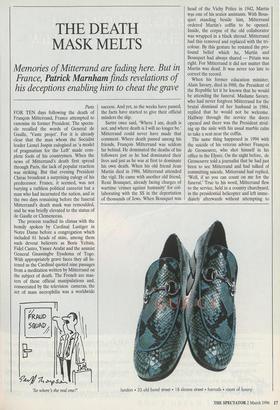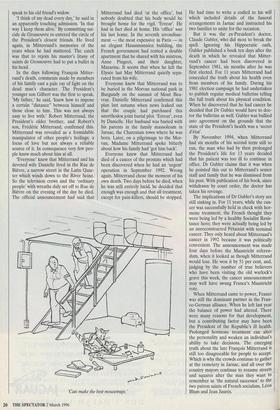THE DEATH MASK MELTS
Memories of Mitterrand are fading here. But in
France, Patrick Marnham finds revelations of
his deceptions enabling him to cheat the grave
Paris FOR TEN days following the death of Francois Mitterrand, France attempted to canonise its former President. The specta- cle recalled the words of General de Gaulle, Waste projet'. For it is already clear that the man whom the Socialist leader Lionel Jospin eulogised as 'a model of pragmatism for the Left' made com- plete fools of his countrymen. When the news of Mitterrand's death first spread through Paris, the lack of popular reaction was striking. But that evening President Chirac broadcast a surprising eulogy of his predecessor. France, it seemed, was not burying a ruthless political careerist but a man who had incarnated the nation, and in the two days remaining before the funeral Mitterrand's death mask was remoulded, and he was briefly elevated to the status of de Gaulle or Clemenceau.
The process reached its climax with the homily spoken by Cardinal Lustiger in Notre Dame before a congregation which included 61 heads of state, among them such devout believers as Boris Yeltsin, Fidel Castro, Yasser Arafat and the animist General Gnassingbe Eyadema of Togo. With appropriately grave faces they all lis- tened as the Cardinal quoted nine passages from a meditation written by Mitterrand on the subject of death. The French are mas- ters of these official manipulations and, consecrated by the television cameras, the act of mass necrophilia was a worldwide `So where's the real one?' success. And yet, as the weeks have passed, the facts have started to give their official minders the slip.
Sartre once said, 'Where I am, death is not, and where death is I will no longer be.' Mitterrand could never have made that comment. Where death passed among his friends, Francois Mitterrand was seldom far behind. He dominated the deaths of his followers just as he had dominated their lives and just as he was at first to dominate his own death. When his old friend Jean Martin died in 1986, Mitterrand attended the vigil. He came with another old friend, Rene Bousquet, already facing charges of wartime 'crimes against humanity' for col- laborating with the SS in the deportation of thousands of Jews. When Bousquet was head of the Vichy Police in 1942, Martin was one of his senior assistants. With Bons- quet standing beside him, Mitterrand ordered Martin's coffin to be opened. Inside, the corpse of the old collaborator was wrapped in a black shroud. Mitterrand had this removed and replaced with the tri- colour. By this gesture he restated the pro- found belief which he, Martin and Bousquet had always shared — Main was right. For Mitterrand it did not matter that Martin was dead. It was never too late to correct the record.
When his former education minister, Alain Savary, died in 1988, the President of the Republic let it be known that he would be attending the funeral. Madame Savary, who had never forgiven Mitterrand for the brutal dismissal of her husband in 1984, replied that he would not be welcome. Halfway through the service the doors opened and there was the President strid- ing up the aisle with his usual marble calm to take a seat near the coffin.
The same thing happened in 1994 with the suicide of his veteran adviser Francois de Grossouvre, who shot himself in his office in the Elysee. On the night before, de Grossouvre told a journalist that he had just been to see Mitterrand and had talked of committing suicide. Mitterrand had replied, `Well, if so you can count on me for the funeral.' True to his word, Mitterrand flew to the service, held in a country churchyard, in the presidential helicopter and left imme- diately afterwards without attempting to speak to his old friend's widow.
`I think of my dead every day,' he said in an apparently touching admission. 'In that way I keep them alive.' By committing sui- cide de Grossouvre re-entered the circle of the President's closest friends. He lived again, in Mitterrand's memories of the years when he had mattered. The catch was that to rejoin his master's litany of saints de Grossouvre had to put a bullet in his head.
In the days following Francois Mitter- rand's death, comments made by members of his family cast a pale ray of light on the dead man's character. The President's younger son Gilbert was the first to speak. `My father,' he said, 'knew how to impose a certain "distance" between himself and those close to him. This was not always easy to live with.' Robert Mitterrand, the President's older brother, and Robert's son, Frederic Mitterrand, confirmed this. Mitterrand was revealed as a formidable manipulator of other people's feelings; a focus of love but not always a reliable source of it. In consequence very few peo- ple knew much about him at all.
`Everyone' knew that Mitterrand and his devoted wife Danielle lived in the Rue de Bievre, a narrow street in the Latin Quar- ter which winds down to the River Seine. So the television crews and the 'ordinary people' with wreaths duly set off to Rue de Bievre on the evening of the day he died. The official announcement had said that Mitterrand had died 'at the office', but nobody doubted that his body would be brought home for the vigil. `Erreue. He had in fact died at home. His 'office' was his last home. In the seventh arrondisse- ment — the most expensive in Paris — in an elegant Haussmannien building, the French government had rented a double apartment that he shared with his mistress, Anne Pingeot, and their daughter, Mazarine. It seems that when he left the Elysee last May Mitterrand quietly sepa- rated from his wife.
Everyone knew that Mitterrand was to be buried in the Morvan national park in Burgundy on the summit of Mont Beu- vray. Danielle Mitterrand confirmed this plan last autumn when news leaked out that the couple had purchased this unorthodox joint burial plot. `Erreue, even by Danielle. Her husband was buried with his parents in the family mausoleum in Jarnac, the Charentais town where he was born. Later, on a pilgrimage to the Mor- van, Madame Mitterrand spoke bitterly about how his family had 'got him back'.
Everyone knew that Mitterrand had died of a cancer of the prostate which had been discovered when he had an 'urgent' operation in September 1992. Wrong again. Mitterrand chose the moment of his own death. Two days before he died, when he was still entirely lucid, he decided that enough was enough and that all treatment, except for pain-killers, should be stopped.
`Cats make the best mousetraps.' He had time to write a codicil to his will which included details of the funeral arrangements in Jarnac and instructed his two families to unite for the occasion.
But it was the ex-President's doctor, Claude Gubler, who did most to break the spell. Ignoring his Hippocratic oath, Gubler published a book ten days after the death in which he revealed that Mitter- rand's cancer had been discovered in September 1981, six months after he was first elected. For 11 years Mitterrand had concealed the truth about his health even from members of his family. During his 1981 election campaign he had undertaken to publish regular medical bulletins telling the full truth about his physical condition. When he discovered that he had cancer he decided that Dr Gubler would have to doc- tor the bulletins as well. Gubler was bullied into agreement on the grounds that the state of the President's health was a 'secret d'etat'.
By November 1994, when Mitterrand had six months of his second term still to run, the man who had by then prolonged the President's life for 13 years decided that his patient was too ill to continue in office. Dr Gubler claims that it was when he pointed this out to Mitterrand's senior staff and family that he was dismissed from his post. With publication of his book, since withdrawn by court order, the doctor has taken his revenge.
The implications of Dr Gubler's story are still sinking in. For 11 years, while the can- cer was successfully held in check with hor- mone treatment, the French thought they were being led by a healthy Socialist Resis- tance hero; they were actually being led by an unreconstructed Petainist with terminal cancer. They only heard about Mitterrand's cancer in 1992 because it was politically convenient. The announcement was made four days before the Maastricht referen- dum, when it looked as though Mitterrand would lose. He won it by 51 per cent, and, judging by the number of true believers who have been visiting the old warlock's grave this week, the cancer announcement may well have swung France's Maastricht vote.
When Mitterrand came to power, France was still the dominant partner in the Fran- co-German alliance. When he left last year the balance of power had altered. There were many reasons for that development, but a contributing factor may have been the President of the Republic's ill health. Prolonged hormone treatment can alter the personality and weaken an individual's ability to take decisions. The emerging truth about the late Francois Mitterrand is still too disagreeable for people to accept. Which is why the crowds continue to gather at the cemetery in Jarnac, and all over the country mayors continue to rename streets and squares after the man they want to remember as 'the natural successor' to the two patron saints of French socialism, Leon Blum and Jean Jaures.



































































 Previous page
Previous page